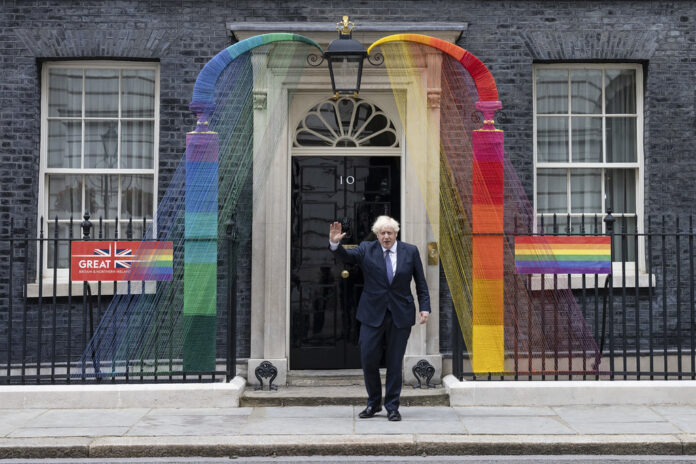6 July 2021
In the news:
The Prime Minister this week held a garden reception celebrating Pride Month and welcoming members of the LGBTQ+ community from across the UK. The PM told the reception audience “we’ve got your back here in this government, we’re determined to stick up for equalities for LGBT people in any way we can.” This assertion came three years after his own government promised to ban conversion therapy, a term used to describe a variety of practices which attempt to erase, repress or change a person’s sexual orientation and/or gender identity.
Johnson’s promise to support the LGBTQ+ community also came after the first meeting of the Ban Conversion Therapy Legal Forum, a group of lawyers, academics, cross-party MPs and campaigners, chaired by Baroness Helena Kennedy. The group released a statement advising the government that the “best way of banning conversion therapy is by using a combination of both civil and criminal remedies” and that the legislation “must be human rights compliant”, prioritising the rights of victims and potential victims. The Forum acknowledged a ban might impact certain other rights including freedom of religion and belief and freedom of expression, but said the harm caused to LGBTQ+ people, which “amounts to degrading and inhuman treatment”, justified a proportionate restriction of those rights.
In other news:
The All-Party Parliamentary Group on Democracy and the Constitution released a report on its independent inquiry into whether the rights to freedom of expression and peaceful assembly were respected in the policing of the Clapham Common vigil for Sarah Everard on 13 March and the “Kill the Bill” protests in Bristol from 26-29 March. The report, published 1 July, found that the Metropolitan Police Service (MPS) and the Avon and Somerset Constabulary (A&SC) “failed to understand the nature of the right to protest and how it must be applied in practice” and that their use of power “exacerbated tensions and increased the risk of violence”. The APPG recommended a new statutory code for the right to protest and policing of protests; removing clauses 55-61 of the Police, Crime, Sentencing and Courts Bill; and a consultation on the creation of an Independent Protest Commission.
In the courts:
In Rashad Maqsood Abbasi and Aliya Abassi (Applicants) v Newcastle upon Tyne Hospitals NHS Foundation Trust (Respondent) and PA Media (Intervener) [2021] EWHC 1699 (Fam) and Takesha Thomas and Lanre Haastrup (Applicants) v Kings College Hospital NHS Trust (Respondent) and PA Media (Intervener) [2021] EWHC 1699 (Fam) the court considered the jurisdiction, if any, that the High Court Family Division has to maintain a Reporting Restriction Order (‘RRO’) prohibiting the naming of any medical clinicians as being involved in the care and treatment of a child who had been the subject of “end of life” proceedings before the High Court prior to their death.
FDJ, R (On the Application Of) v Secretary of State for Justice (Rev 1) [2021] EWHC 1746 (Admin) – the High Court dismissed a cisgender female prisoner’s claim challenging the lawfulness of the Justice Secretary’s policy in relation to the detention of transgender women. In particular, her objection was to the assignment to women’s prisons of transgender women convicted of sexual or violent offences against women. As Lord Justice Holroyde stated, the difficulty was that it was not possible to argue that all transgender women should be excluded from women’s prisons as this would “impermissibly” ignore their right to live in their chosen gender [83]. The Claimant submitted that the Justice Secretary should have invoked schedule 3 of the Equality Act 2010, which allows exemptions to non-discrimination in single sex spaces, but the court held that the application of schedule 3 is discretionary. Lord Justice Holroyde said the government’s policy of assessing cases individually for risks and risk-management allowed for high-risk transgender prisoners to have limited contact with cisgender prisoners, and was sufficient to prevent “unjustified or disproportionate interference with the Convention rights of women prisoners.” [89]
Safe Passage International, R (On the Application Of) v Secretary of State for the Home Department [2021] EWHC 1821 (Admin) – the High Court ruled that Home Office policies regarding unaccompanied minors seeking family reunification in the UK were unlawful and a misstatement of the law. The judicial review claim was brought by refugee rights organisation Safe Passage, which gave three grounds for judicial review. First, that Home Office guidance inaccurately stated that information should be obtained from local authorities only once a family link is established, which is too late to inform an asylum assessment. Second, that the guidance unlawfully advises case-workers to refuse applicants whose investigations are not completed within the EU-mandated time-frame, which no longer applies post-Brexit. Third, that the guidance sets out an unlawful practice in relation to re-examination requests, which misapplies a decision of the Court of Justice of the European Union. The claim was successful on the first two grounds.
On the UKHRB:
Credit: Source link











